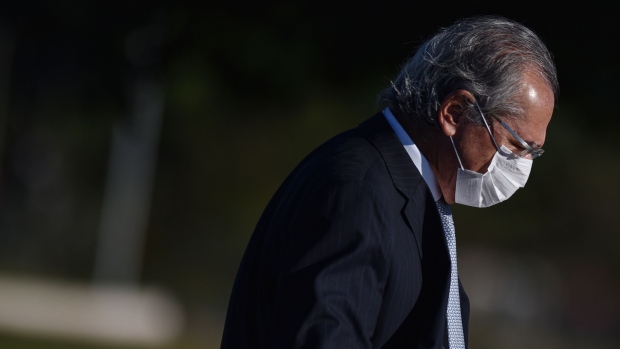Feb 23, 2021
Brazil Economy Chief Fades Away as Bolsonaro Takes the Reins
, Bloomberg News

(Bloomberg) -- Paulo Guedes joined the administration of Brazil’s Jair Bolsonaro in 2019 as a super minister with the mission to fix and run Latin America’s largest economy through an ambitious program of privatizations, spending and tax cuts, and deregulation.
Two years later, it’s his boss, who admittedly understands nothing about economy, who’s increasingly calling the shots and moving away from Guedes’ market-friendly agenda.
Bolsonaro’s decision to replace the head of state-controlled oil company Petrobras after a feud over fuel prices sent Brazilian markets into a tailspin on Monday, with investors viewing the move as a sign that Guedes’ era is drawing to a close.
Guedes future in office is still a matter of concern for many investors who see him as the last line of defense against Bolsonaro’s natural inclination toward interventionist policies amid a record fiscal deficit. The stakes are rising as Brazil’s economic recovery sputters and the president increasingly worries about the 2022 presidential campaign, with his popularity dropping after a program of Covid aid to the poor expired in December.
“Guedes is in a complicated spot. The impression is that he no longer has the strength he had in 2019,” said Sergio Vale, chief economist with MB Associados. “With the president looking at re-election, prices climbing as they are and his popularity this low, the economy minister ends up being steam rolled -- like he was now.”
BRAZIL INSIGHT: Bolsonaro’s Fuel Crusade Risks Credibility Decay
The ouster of the Petrobras’ CEO is particularly revealing of Guedes’ standing in the government because it mirrors a similar confrontation in 2019, when the president suspended a planned fuel-price hike by the oil company. At the occasion, Guedes said he would “fix” the situation.
This time, the minister has remained silent as he watched the demise of Roberto Castello Branco, the outgoing chief executive officer of Petrobras. Castello Branco was one of Guedes’ fellow colleagues from the University of Chicago, whom he personally invited to join the government and help him implement the pro-market economic policies the school is famous for.
The economy ministry declined to comment on the story.
Obstinate, Defeated
The fact that Bolsonaro -- as one person familiar with his thinking described it -- no longer shows any scruples about undermining Guedes’ market friendly agenda just leaves investors and former members of the economic team wondering what is holding the minister in office.
“Guedes is resilient, obstinate and determined, but he did not realize that he was defeated,” Salim Mattar, former privatizations secretary and a close friend of the minister, said in an interview to newspaper O Estado de S.Paulo over the weekend. Mattar stepped down in 2020 saying he was frustrated with lack of progress in the privatization program.
Guedes doesn’t want to step down before leaving an economic legacy he can be proud of, according to three government officials close to him. Yet he has started to signal that his permanence in the government hinges on the future of an emergency bill that lawmakers are set to start voting on Thursday.
The constitutional amendment would allow the government to bypass fiscal rules for a second consecutive year to provide another round of cash handouts to poor Brazilians. In exchange, it establishes a new crisis protocol for future emergency spending. Even if approved as suggested by Guedes, the proposal pales in comparison with his initial plans to reestablish fiscal austerity in Brazil this year.
The outlook for additional austerity reforms in congress also looks uncertain under the new leadership of Lower House Speaker Arthur Lira, elected this year to replace Rodrigo Maia. While more politically aligned with Bolsonaro and willing to deliver on some reforms, the new house speaker has no commitment to Guedes’ market-friendly agenda, according to a top lawmaker close to him.
Instead, the legislator said, Guedes will navigate even more troubled waters from now on as Bolsonaro is making increasingly clear that he’s not willing to follow recommendations from his economic advisers.
“Of course the new house leadership is more tolerant of interventionism,” said Kim Kataguiri, a lawmaker critical of Bolsonaro who is deputy leader of the center-right Democrats party. “Lira has been elected on a public spending platform and, behind the scenes, he is a fierce critic of economic liberalism.”
©2021 Bloomberg L.P.


